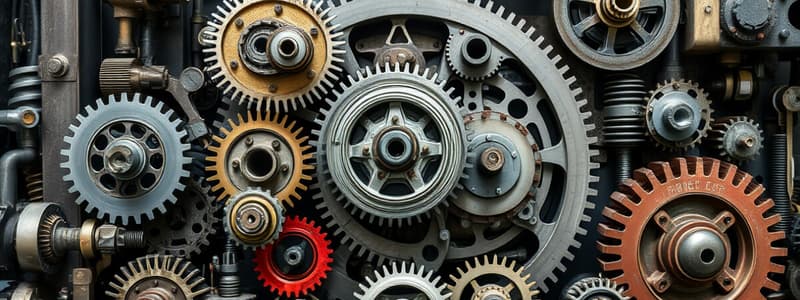Podcast
Questions and Answers
What are interchangeable parts?
What are interchangeable parts?
- Standardized parts that are identical and interchangeable (correct)
- Parts made by different manufacturers
- Unique parts designed for specific devices
- Parts that are only made for military use
What was the Enclosure Movement?
What was the Enclosure Movement?
A movement that forced agrarian poor off village commons to make way for private property and modern farming practices.
What are domestic systems?
What are domestic systems?
An early industrial labor system where workers produced goods at home.
Define infrastructure.
Define infrastructure.
What are textiles?
What are textiles?
What are cottage industries?
What are cottage industries?
What led to the creation of canal systems?
What led to the creation of canal systems?
What are joint stock companies?
What are joint stock companies?
Define mass production.
Define mass production.
What is division of labor?
What is division of labor?
What does mechanization refer to in agriculture?
What does mechanization refer to in agriculture?
Who is Adam Smith?
Who is Adam Smith?
What is Eli Whitney known for?
What is Eli Whitney known for?
Who is James Watt?
Who is James Watt?
Who was Robert Owen?
Who was Robert Owen?
What is Thomas Edison best known for?
What is Thomas Edison best known for?
What is Charles Dickens known for?
What is Charles Dickens known for?
Define Romanticism.
Define Romanticism.
Flashcards are hidden until you start studying
Study Notes
Interchangeable Parts
- Developed by Eli Whitney between 1799-1800, introducing standardized and identical components for manufacturing.
- Allowed for easier repairs and replacements of broken device parts, enhancing production efficiency.
- First application was in the manufacturing of muskets for the U.S. government.
Enclosure Movement
- A 18th-century initiative by wealthy British aristocrats aimed at consolidating farming lands.
- Implemented new agricultural technologies and crop rotations, resulting in the displacement of poor agrarian communities from common lands into private enclosures.
Domestic Systems
- An early industrial labor system where goods were produced by workers at home rather than in centralized factories.
Infrastructure
- Refers to essential facilities and systems such as transportation, communication networks, power plants, and educational institutions within a country or area.
Textiles
- Woven or knitted cloth that served as a major export for India, significantly impacting its economy.
Cottage Industries
- Home-based manufacturing activities involving part-time production of crafts and household goods such as sewing and lace-making.
Canal Systems
- Developed during the Industrial Revolution to provide an efficient means for transporting goods in large quantities.
Joint Stock Companies
- 17th-century English corporations that allowed multiple investors to pool resources through stock sales to finance overseas trade and exploration.
Mass Production
- The practice of rapidly and cheaply producing large quantities of goods, revolutionizing manufacturing.
Division of Labor
- A production approach where work is subdivided into separate tasks assigned to different workers to enhance efficiency.
Mechanization
- The transition in agriculture from human labor to the use of technology and machines for productivity.
Adam Smith
- Scottish economist (1723-1790) known for "Wealth of Nations", advocating for laissez-faire capitalism and free trade while critiquing mercantilism.
- Emphasized the role of individual self-interest in economic activities and the importance of supply and demand in setting prices.
Eli Whitney
- Inventor of the cotton gin in 1793; significantly boosted cotton production, which increased the plantation economy and the demand for enslaved labor in the South.
James Watt
- Scottish engineer who enhanced the steam engine, greatly improving its efficiency and effectiveness; credited with pivotal innovations like controlling steam pressure with a governor.
Robert Owen
- British cotton manufacturer (1771-1858) who believed in creating cooperative societies to reveal human goodness; tested his ideas at New Lanark and New Harmony but encountered failures.
Thomas Edison
- American inventor (1847-1931) with over 1,000 patents, including the light bulb; established a power plant that provided electricity to parts of New York City.
Charles Dickens
- English author (1812-1870) recognized for his realistic portrayal of class disparities in 19th-century England; his works highlighted the struggles of the lower classes.
Romanticism
- A 19th-century artistic and literary movement in Western Europe that emphasized emotion, nature, and individualism, often in contrast to the Industrial Revolution's rationality and progress.
Studying That Suits You
Use AI to generate personalized quizzes and flashcards to suit your learning preferences.




